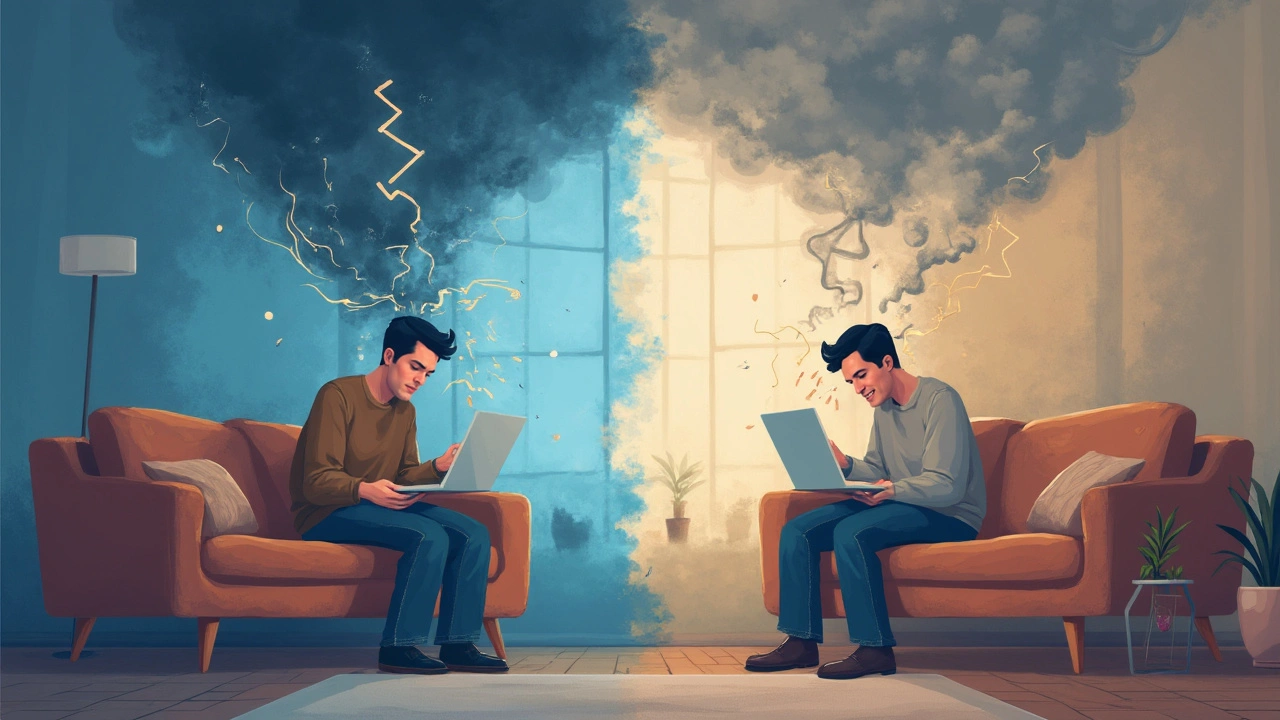If you deal with migraines, you probably know the drill—a throbbing head, lights too bright, sounds too loud, and you just want to hide. Chronic fatigue syndrome (or CFS) is different but just as tricky. It's not just feeling tired; it's bone-deep exhaustion that sleep doesn't fix. Now here's the kicker: a bunch of people deal with both at the same time, and that combo packs an extra punch.
Doctors notice this link more and more. If you often get migraines and also feel wiped out for weeks or months with no real reason, you might be dealing with both. This isn't rare—it's just not talked about as much as it should be. And when the symptoms pile up, daily stuff, like work or hanging out, can suddenly feel out of reach.
Why do they show up together? Scientists think nerves, hormones, and the immune system are all tangled up in both conditions. Each one alone is tough, but together, it’s like your brain and body are fighting on two fronts. Recognizing this link is a game-changer. Getting the right diagnosis often means better treatment and a chance to actually feel more like yourself again.
- What Sets Migraines and Chronic Fatigue Syndrome Apart?
- How Are Migraine and CFS Linked?
- Weird Symptoms No One Talks About
- Daily Struggles and Smart Coping Tricks
- When to Call for Backup: Getting Medical Help
What Sets Migraines and Chronic Fatigue Syndrome Apart?
First, let's clear up what each condition actually is. A migraine isn’t just a ‘bad headache’. It often brings pounding pain, but also nausea, seeing weird flashing lights, or even trouble talking. Most folks with migraines feel wiped out for a few hours to days after an attack. The pain usually gets worse with bright lights, loud noises, or moving around. Attacks can hit once in a blue moon or show up several times a month.
On the flip side, chronic fatigue syndrome (CFS) — sometimes called myalgic encephalomyelitis or ME — is all about exhaustion. Not the normal ‘need another coffee’ tired, but the kind that sticks around for at least six months. Sleep doesn’t make it go away. People with CFS also deal with brain fog, sore muscles, and feel worse after any effort, even just climbing the stairs. That’s called post-exertional malaise.
The main differences boil down to:
- Migraine mainly causes intense head pain, sensitivity, and neurological weirdness like auras.
- CFS centers on constant exhaustion, sleep issues, memory problems, and that heavy feeling after any activity.
Here’s a simple stats snapshot showing the differences between the two:
| Condition | Main Symptom | Common Triggers | How Long It Lasts |
|---|---|---|---|
| Migraine | Headache, Light/Sound Sensitivity | Stress, Certain Foods, Hormones | 4-72 hours per attack |
| Chronic Fatigue Syndrome (CFS) | Extreme Tiredness | Physical or Mental Effort | 6+ months ongoing |
Sometimes, migraine and CFS cluster together; other times, folks only have one. But knowing exactly what you're dealing with means you’re one step closer to managing it.
How Are Migraine and CFS Linked?
You might think migraine and chronic fatigue syndrome (CFS) are worlds apart, but there’s a surprising overlap. Both make you miserable, but not just in obvious ways. The real link? What's happening inside your body. Doctors and researchers are starting to see how closely the wiring for both conditions lines up—especially when it comes to nerves, hormones, and the immune system.
Here’s the deal: your nervous system is like a busy city, buzzing with messages all day. When you have migraine or CFS, some of these messages get scrambled. People with CFS are way more likely to have migraines than those without. In fact, studies say about 80% of people with CFS report getting frequent headaches, and migraines make up a big chunk of those.
There’s a twist with body chemistry, too. Both conditions mess with serotonin, a brain chemical that helps control pain, mood, and sleep. Low serotonin is common in both migraine attacks and CFS flare-ups. On top of that, the immune system goes into overdrive for people with either condition—think inflammation and odd responses that leave you feeling wiped out or in pain.
| Shared Features | Migraine | Chronic Fatigue Syndrome |
|---|---|---|
| Sleep Issues | Yes | Yes |
| Brain Fog | Common | Common |
| Sensitivity to Light and Sound | Definitely | Often |
| Muscle Pain | Sometimes | Often |
When you put all this together, it’s not shocking that the two conditions can show up at the same time. If your body is already fired up from migraines, you might be more at risk for the exhausting symptoms of CFS—and vice versa. That’s why doctors now pay more attention if you’re dealing with both. Knowing about this link helps you ask better questions and push for treatments that cover the full picture, not just part of it.

Weird Symptoms No One Talks About
You’d think migraine and chronic fatigue syndrome are just about the pain or feeling tired, but there’s more that gets swept under the rug. Ever had brain fog so bad you can’t find words, or forgot what you were just doing? That happens a lot with both these conditions. Some people start missing appointments, struggle with basic math, or just zone out mid-sentence. It’s not laziness—your brain literally feels like it’s running on empty.
Another thing nobody warns you about: dizziness that comes and goes. It’s not your usual lightheaded feeling. For folks with migraine and CFS, standing up can make the world spin, and sometimes you need to sit right back down or risk taking a tumble. Moving your head too quickly can make it worse.
Strange sleep problems are also big here. You might fall asleep but wake up feeling like you barely closed your eyes. Some deal with restless legs, weird dreams, or waking up at 3 a.m. for no reason—none of that helps when you already feel wiped out.
Sensitivity is another hidden issue. Light, sound, or even mild smells can feel overwhelming during a migraine, but with chronic fatigue syndrome? Sometimes it’s even the texture of your clothes or the tag on your shirt that just drives you nuts. Your nervous system gets on edge all the time.
- Tingling or numbness—like your hands or face are "asleep" for no reason
- Digestive issues—stomach pain, random diarrhea or constipation show up in many with these conditions
- Sore throat that comes and goes, even without a cold
- Feeling feverish or getting night sweats, but your temperature is normal
A recent clinic survey found that people with both migraine and chronic fatigue syndrome report missing more days of work or school (on average, 17 per year) than those with just one of the conditions. That’s a lot of lost time.
If you’ve got these symptoms, you’re not weird—you’re just not alone, even if no one seems to talk about this stuff out loud.
Daily Struggles and Smart Coping Tricks
If you’re stuck juggling migraine attacks and chronic fatigue syndrome (CFS), life can feel like walking uphill with a backpack full of bricks. Working, parenting, or even keeping up with friends starts to take way more effort than it should. Brain fog isn’t just a meme—it’s a real problem. You might forget words mid-sentence, or stare at your coffee not remembering if you already added milk. And sometimes, you just don’t have the energy for normal stuff, even things you used to love.
Some folks push through and end up feeling worse—a classic CFS crash. That’s why pacing is so important. Energy management becomes almost like a budget: if you overspend, you pay with days on the couch. Here’s how a lot of people keep things in check:
- Keep a symptom diary. Jot down when you get headaches, how tired you are, how you slept, and anything you ate or did right before. Patterns jump out and you can spot triggers you might have missed.
- Plan for "crash days." Have easy meals on hand, line up your favorite show, and let friends or family know you might be completely off the radar for a bit.
- Break tasks into pieces. Instead of cleaning the whole house, do one room (or even just a corner), rest, and then see how you feel.
- Use alarms and reminders. Apps or even sticky notes help when brain fog hits. Set reminders for meds, meals, and even water breaks.
- Light and noise control. Migraine and CFS often make you sensitive to your environment. Sunglasses, noise-cancelling headphones, and blackout curtains can be a game-changer.
It’s not just about the practical stuff, though. Emotional support matters. People with both migraine and CFS face double the frustration and guilt, especially when plans get canceled last minute. Online forums and support groups can really help. You’ll realize you’re not the only one making backup plans for your backup plans.
Here’s a table showing common struggles folks report when dealing with both migraine and CFS:
| Struggle | What Helps |
|---|---|
| Unpredictable crashes | Flexible routines, letting people know ahead of time |
| Forgetfulness/brain fog | Setting alarms, using checklists |
| Sensory overload | Quiet, dark spaces, sunglasses, headphones |
| Chronic pain and fatigue | Breaks, gentle stretches, prioritizing rest |
No trick will magically "fix" migraine or CFS, but smart planning gives you a fighting chance to keep life rolling—at least most days. Sometimes, accepting limits isn’t failure; it’s strategy.

When to Call for Backup: Getting Medical Help
There’s only so much you can handle alone when it comes to migraine and chronic fatigue syndrome (CFS). Sometimes trying to tough it out just doesn’t work, and it’s time to get a doctor on your team. But when’s the right moment?
If your migraine or exhaustion starts wrecking daily plans—or if basic things like getting out of bed, making food, or focusing at work feel impossible for days—those are red flags. Migraines that drag on, change suddenly, or come with symptoms like a stiff neck, vision loss, or confusion should never be ignored. And if you’re so tired that it’s stopping you from handling basic life stuff, you’re overdue for a medical chat.
Getting help isn’t just about relief right now. It’s about getting the right diagnosis. Loads of people with CFS or long-term migraine symptoms aren’t fully diagnosed. The right doctor (usually a neurologist for migraines or someone familiar with CFS) can figure out if something else is going on, like an autoimmune problem, a sleep disorder, or nutrient issues.
Here’s when it’s smart to make that call:
- New or “the worst ever” head pain
- Headache that hits after a head injury
- Vision loss, fainting, or trouble talking
- Fatigue that lasts over six months and doesn’t go away after rest
- Fever, weight loss, or night sweats along with your other symptoms
Your doctor will probably ask about your symptoms, triggers, and daily habits. Sometimes you’ll get blood tests, brain scans, or referrals to other specialists. It can feel like a lot, but don’t downplay your struggles just to get through the visit. The more details you share, the better chance you’ll get a treatment plan that actually works for you.
Here’s a quick look at why folks with migraine and CFS reach out for help, based on a recent clinic survey:
| Reason for Visit | % of Patients |
|---|---|
| Uncontrolled pain | 65% |
| Extreme fatigue | 50% |
| New neurological symptoms | 22% |
| Impact on work/school | 35% |
If your pain, brain fog, or tiredness makes you feel stuck or worried, don’t wait. The sooner you loop in a doctor, the better your shot at getting back into your regular routine—and maybe even finding a bit of relief.






Comments
Tiarna Mitchell-Heath
27/Apr/2025Seriously, if you’ve been dismissed by doctors because they think you’re just lazy, that’s a massive slap in the face. Push back hard, demand a proper workup, and quit letting anyone tell you your pain is imaginary. The system owes you respect, not pity.
Katie Jenkins
27/Apr/2025First off, the overlap between migraines and CFS isn’t just anecdotal – multiple peer‑reviewed studies have quantified a roughly 80% comorbidity rate. The shared pathophysiology points to dysregulated serotonin pathways, mitochondrial dysfunction, and a chronic low‑grade inflammatory state. That means treating one condition in isolation often leaves the other unchecked, which is why patients report persistent fatigue even after successful migraine prophylaxis. A multidisciplinary approach, incorporating neurologists, immunologists, and even sleep specialists, yields the best outcomes. Keep a symptom diary: note headache onset, intensity, triggers, and fatigue levels; patterns will emerge that you can discuss with your provider. Also, lifestyle modifications – consistent sleep hygiene, graded exercise therapy, and stress‑reduction techniques – can blunt both attack frequency and post‑exertional malaise. Don’t ignore the psychosocial component; chronic illness often fuels anxiety and depression, which in turn exacerbate pain perception. Finally, be your own advocate: request specific labs (e.g., cytokine panels, mitochondrial markers) if you feel they’re warranted.
Jack Marsh
27/Apr/2025It is tempting to attribute the association to mere coincidence, yet the data suggest otherwise. The neurovascular theory alone cannot explain the pervasive fatigue reported by migraineurs. Moreover, immunological markers such as elevated IL‑6 are consistently observed across both cohorts. Therefore, a singular focus on headache relief is insufficient.
Terry Lim
27/Apr/2025Looks like you’re just lazy.
Cayla Orahood
27/Apr/2025Okay, let me break it down for everyone who thinks this is just “a bad headache and some tiredness”. First, the brain fog isn’t a cute metaphor – it’s a literal cloud that makes you feel like you’re watching life through a frosted glass. You stare at your laptop and the words melt into each other, forcing you to reread the same sentence over and over. Then there’s the relentless dizziness that can turn a simple trip to the kitchen into a spin‑class you didn’t sign up for. People say “just drink water,” but dehydration is the least of the worries when your vestibular system is on a roller‑coaster.
Sleep? Forget it. You might finally drift off for a few hours, only to wake up feeling as if you’ve run a marathon in your dreams. Restless legs, night sweats, and random feverish chills become the unwanted companions of an already chaotic night.
Now, the sensory overload deserves its own section. Bright fluorescent lights feel like laser beams, fluorescent office buzz is a torture device, and even the faintest perfume can trigger a full‑blown migraine that drags you into a dark room for days. That’s why people stock up on blackout curtains, noise‑cancelling headphones, and a supply of plain, fragrance‑free clothing.
On the hormonal front, serotonin levels wobble like a bad Wi‑Fi connection, messing with mood, pain perception, and sleep cycles simultaneously. The immune system, meanwhile, is stuck in a constant “red alert” mode, spewing cytokines that make you feel achy and exhausted even after a minimal effort.
Socially, you’re stuck in a perpetual “I’m fine” loop, because admitting you can’t make it to a brunch or a work meeting feels like admitting defeat. This leads to a hidden emotional toll: guilt, shame, and an ever‑growing sense of isolation.
Every doctor you see may give you a different piece of the puzzle, but rarely does anyone hand you the full picture. That’s why self‑advocacy is crucial – you become the project manager of your own health, coordinating neurologists, immunologists, and physiotherapists.
Bottom line: this isn’t “just a headache and being tired”. It’s an all‑encompassing syndromic storm that hijacks your nervous system, hormones, immune response, and daily life. The only way to survive is to understand the depth of the connection and fight for a comprehensive treatment plan that addresses every facet, not just the loudest symptom.
McKenna Baldock
27/Apr/2025I appreciate the thoroughness of the previous comment and would add that a philosophical acceptance of one’s limits can reduce the mental friction of daily struggles. By reframing “crash days” as needed rest rather than failure, the emotional burden lessens. Combining this mindset with practical tools like symptom diaries creates a balanced approach that honors both the body and the mind.
Roger Wing
27/Apr/2025Look, all this mindfulness stuff is nice until you’re too exhausted to even think. Data shows many patients just need more meds, not poems.
Matt Cress
27/Apr/2025Wow, another post about “just get enough sleep”. Like that’s a fix when my brain feels like a busted toaster. Honestly, I’ve tried every over‑the‑counter thing, and the only thing that works is a good dose of sarcasm and a blackout curtain. If you’re not over‑stimulated, you’re probably not trying hard enough.
Andy Williams
27/Apr/2025While sarcasm can be a coping mechanism, it doesn’t replace medical intervention. I’ve found that structured pacing and regular follow‑ups with a neurologist have been more effective than any snarky comment.
Paige Crippen
27/Apr/2025There’s definitely something hidden behind the official diagnoses.